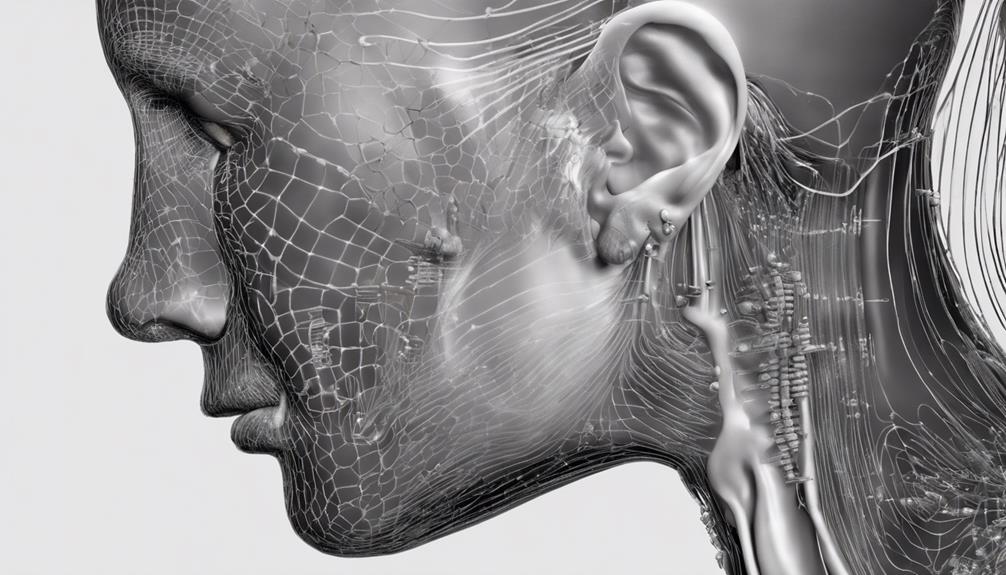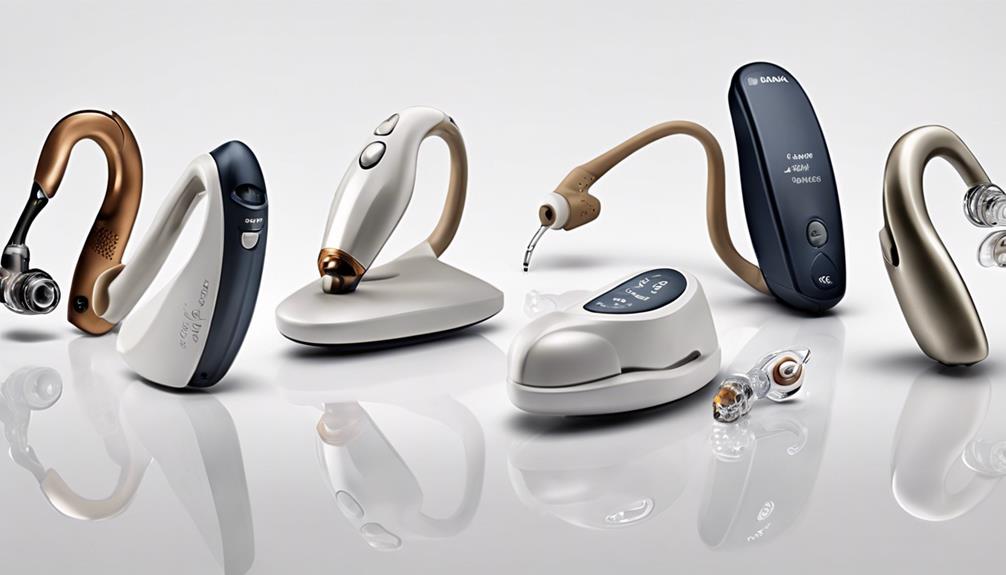Imagine standing on a quiet beach, the sound of waves gently lapping at the shore, and suddenly tuning in to a distant radio broadcast as if by magic.
Have you ever wondered how our ears have the remarkable ability to pick up these invisible signals?
Understanding the intricacies of radio signal reception can offer insights into the fascinating world of auditory perception and communication.
Key Takeaways
- Ears convert radio waves into electrical signals for processing.
- The auditory cortex interprets radio signals for sound perception.
- Mechanoreceptors play a crucial role in converting radio waves to auditory information.
- Cochlear hair cells transduce radio wave vibrations into neural impulses.
Sound Waves and Ear Anatomy
Regularly, our ears function as intricate mechanisms that capture sound waves and convert them into electrical signals for our brain to interpret.
When it comes to picking up radio signals, the process differs slightly. Instead of sound waves, radio waves are collected by devices like antennas or in some cases, dental fillings, acting as a receiver. These radio waves are then converted into radio signals, which are a form of electromagnetic waves, by the radio transmitter.
The radio signals are transmitted through the air and can be picked up by radio receivers, such as radios or even specialized equipment designed to interpret specific frequencies.
In the context of our ears, they aren't naturally designed to detect radio signals in the same way as sound waves, as our auditory system is specifically tuned to process vibrations in the audible frequency range.
Despite this, the intricate workings of the ear serve as a reminder of the marvels of human physiology in capturing and interpreting various forms of stimuli.
Mechanoreceptors in the Ear
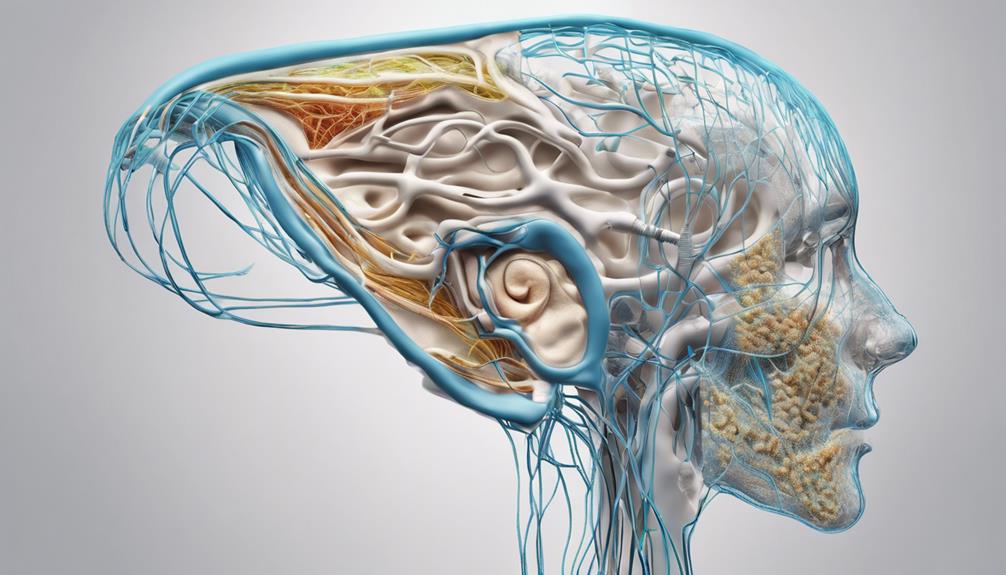
Mechanoreceptors in the ear, such as the specialized hair cells in the cochlea, play a pivotal role in our auditory system.
These sensory cells are responsible for transducing mechanical vibrations into electrical signals, which are then interpreted by the brain.
The tonotopic organization of mechanoreceptors allows for the discrimination of different sound frequencies, enabling us to perceive a wide range of auditory stimuli.
Ear's Sensory Mechanism
Within the intricate sensory mechanism of the ear, specialized cells known as mechanoreceptors in the cochlea diligently convert mechanical stimuli, such as sound waves, into essential electrical signals for transmission to the brain. These receptors, located in the inner ear, detect vibrations, and play a crucial role in our ability to perceive sound frequencies and intensities. When sound waves enter the ear, they cause tiny hair cells within the cochlea to bend, initiating signal transmission. The movement of these hair cells generates electrical impulses that travel along the auditory nerve for processing in the brain. The sensitivity and responsiveness of mechanoreceptors enable us to interpret a wide range of sounds effectively.
- Mechanoreceptors in the ear convert mechanical stimuli into electrical signals.
- These receptors are located in the inner ear, specifically in the cochlea.
- Sound waves cause tiny hair cells in the cochlea to bend, initiating signal transmission.
- Movement of hair cells generates electrical impulses that travel to the brain.
- Mechanoreceptors' sensitivity and responsiveness are crucial for interpreting sound.
Sound Reception Process
In the intricate process of sound reception in the ear, specialized mechanoreceptors diligently convert mechanical vibrations into crucial electrical signals for transmission to the brain. These mechanoreceptors, particularly hair cells in the inner ear, respond to variations in sound pressure, enabling us to perceive diverse frequencies and volumes. The cochlea, a vital component of the inner ear, aids in detecting and processing sound waves by amplifying and transmitting electrical signals to the brain for interpretation. When sound vibrations reach the ear, tiny hair-like structures on the mechanoreceptors bend, initiating the transmission of signals for auditory perception. Below is a table highlighting the role of mechanoreceptors in the ear's sound reception process:
| Mechanoreceptors in the Ear |
|---|
| Convert mechanical vibrations into electrical signals |
| Respond to changes in sound pressure |
| Amplify and transmit signals to the brain |
| Detect and process sound waves |
| Initiate signal transmission for auditory perception |
Cochlea and Signal Processing
The intricate process of signal processing within the cochlea transforms sound vibrations into electrical signals that our brain deciphers for auditory perception. This conversion involves a series of complex interactions and mechanisms that allow us to perceive the world through sound.
Here's a closer look at how the cochlea and signal processing work together:
- Conversion of Sound: The cochlea's hair cells respond to different frequencies of sound by bending, which triggers nerve impulses.
- Interactions: Signal processing in the cochlea involves intricate interactions between hair cells, neurons, and the auditory nerve.
- Frequency Detection: Different regions of the cochlea are specialized in detecting specific frequencies of sound, enabling precise auditory perception.
- Electrical Signal Interpretation: The brain interprets the electrical signals from the cochlea to create our perception of sound, including pitch, volume, and timbre.
- Perceptual Outcome: This process is crucial in enabling us to hear and understand the richness of the auditory world around us.
Neural Pathways to the Brain
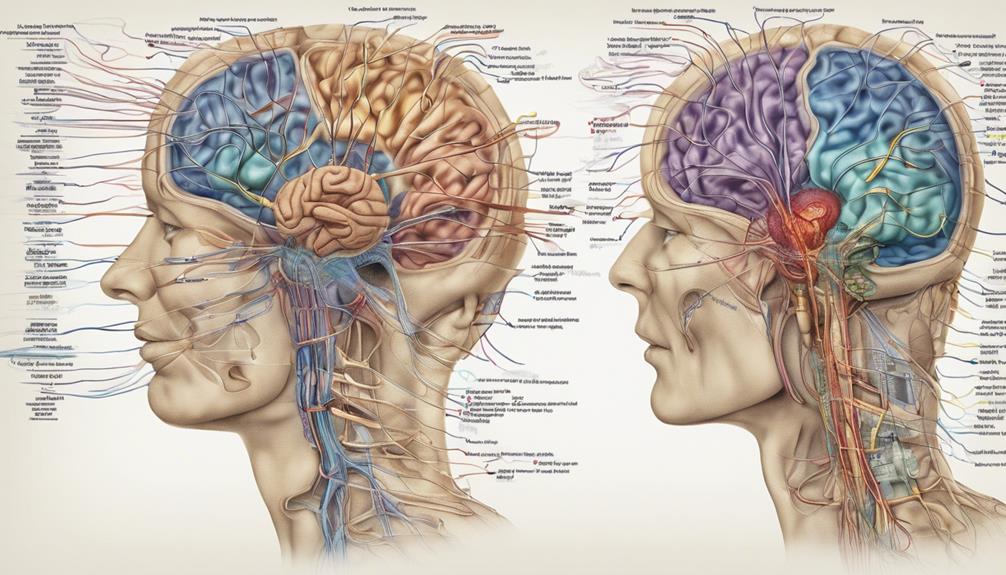
Our auditory system's neural pathways serve as the conduit for transmitting electrical signals from the cochlea to the brainstem, facilitating the intricate process of auditory perception. Once the signals are captured by the cochlea, they travel through the auditory nerve towards the brain's auditory cortex for further processing.
The auditory cortex is responsible for interpreting various aspects of sound, such as pitch and location, by segregating and analyzing the incoming information. This segregation allows for the brain to create a coherent representation of the auditory scene.
Neural synchronization plays a vital role in integrating and making sense of the complex auditory information received. By harmonizing the firing of neurons along these pathways, the brain can effectively process and interpret the signals.
These neural pathways are fundamental in our ability to perceive and comprehend the radio signals that enter our ears, showcasing the intricate and sophisticated mechanisms at play in our auditory system.
Signal Amplification Mechanisms
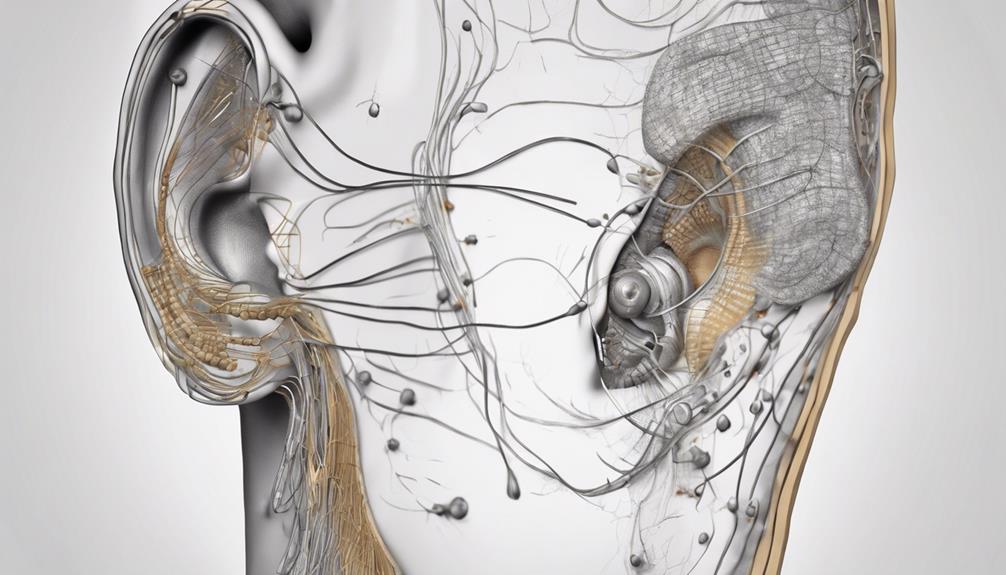
Within radio receivers, the mechanisms for signal amplification play a critical role in enhancing weak radio wave signals to ensure clear auditory reception. Amplification is achieved by utilizing electronic components such as transistors or vacuum tubes in the receiver circuit. The process of amplification works to increase the strength of the audio signal extracted from the radio wave, thereby enhancing the overall sound quality. Proper amplification is essential in minimizing noise and interference, ultimately leading to a more reliable and enjoyable listening experience. Once the audio signal is amplified, it's then directed to the speakers or headphones where it's converted back into sound waves for the listener to hear.
Signal amplification is crucial for boosting weak radio wave signals.
Electronic components like transistors or vacuum tubes are used for amplification.
Amplification process enhances the strength of the audio signal.
Proper amplification minimizes noise and interference for a clearer listening experience.
Amplified audio signals are converted back into sound waves for the listener.
Radio Frequency Detection Process
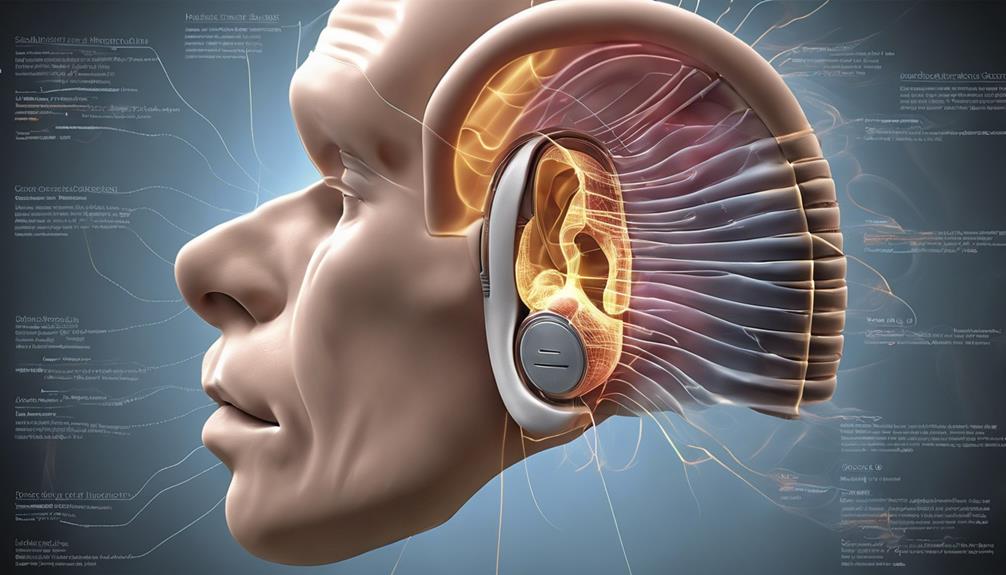
Detecting radio frequencies within the ear involves converting mechanical vibrations from radio waves into electrical signals through specialized hair cells in the cochlea. These hair cells play a crucial role in the process of perceiving radio broadcasts as sound. Below is a detailed breakdown of the radio frequency detection process:
| Radio Frequency Detection Process | Description | Importance |
|---|---|---|
| Antenna Structures in Cochlea | Receive radio signals | Critical for signal capture |
| Hair Cell Conversion Mechanism | Convert vibrations to signals | Essential for signal translation |
| Electrical Signal Transmission | Sent to brain via auditory nerve | Vital for sound perception |
| Brain Interpretation | Decodes signals as sound | Enables understanding |
| Rapid Seamless Process | Occurs swiftly and smoothly | Ensures real-time perception |
Understanding these steps illuminates how our ears efficiently pick up radio signals, transforming them into the sounds we hear and enjoy.
Role of Hair Cells in Reception
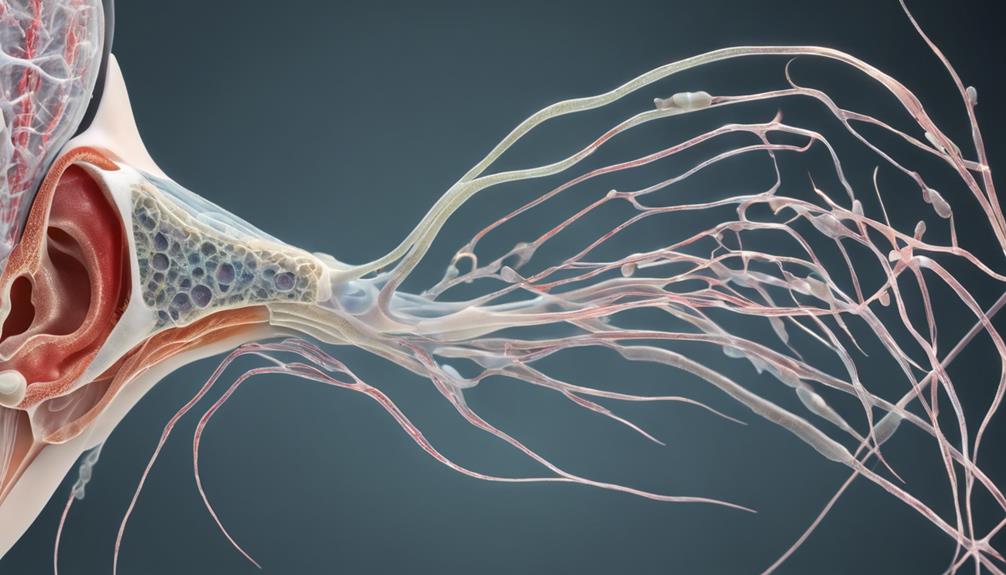
When considering the reception of auditory stimuli, the pivotal role played by hair cells in the inner ear can't be overstated. These specialized cells are crucial in the process of converting mechanical vibrations from sound waves into electrical signals, which are then transmitted to the brain via the auditory nerve for interpretation.
The movement of hair cells in response to sound waves initiates a cascade of neural impulses, enabling us to perceive and differentiate various pitches. Different frequencies of sound waves stimulate distinct sets of hair cells, allowing for the perception of a wide range of sounds.
Damage to these delicate hair cells can lead to hearing loss or difficulties in processing sound information.
- Hair cells convert mechanical vibrations into electrical signals.
- Electrical signals are sent to the brain through the auditory nerve.
- Movement of hair cells triggers neural impulses.
- Different frequencies stimulate different sets of hair cells.
- Damage to hair cells can result in hearing impairments.
Transduction of Radio Waves

As radio waves reach the antenna of a radio receiver, the transduction process begins, converting electromagnetic signals into electrical impulses.
These electrical signals are then meticulously processed within the radio receiver to extract and decode the audio information carried by the radio waves.
Components like the tuner and detector play crucial roles in isolating and converting the specific radio frequency signal into discernible sound waves.
Signal Conversion Process
Converting radio waves into electrical signals, the antenna of the radio receiver plays a crucial role in the signal conversion process. Once the radio waves are captured by the antenna, they undergo a series of transformations to eventually be heard as sound.
Here is a breakdown of the signal conversion process:
- Antenna picks up radio waves.
- Radio waves are converted into electrical signals by the antenna.
- Electrical signals are amplified for increased strength.
- Amplified signals are directed to a speaker or headphones.
- Speaker or headphones convert the electrical signals into sound waves.
This intricate process, known as transduction, allows us to enjoy the audio content transmitted through radio waves with clarity and precision.
Radio Wave Reception
Radio wave reception, facilitated by antennas, involves the conversion of radio waves into electrical signals for further processing in electronic devices. Antennas, present in radios and smartphones, capture radio waves from the environment and transform them into electrical currents.
This transduction process is vital for enabling communication and entertainment through devices that rely on radio waves. The captured electrical signals are then transmitted to electronic circuits for decoding and processing, eventually leading to the production of audio or data.
Without this crucial step of converting radio waves into electrical signals, the seamless functioning of radios, smartphones, and other communication devices wouldn't be possible. This fundamental process forms the basis of how radio signals are received and utilized in everyday technology.
Electrical Signal Generation
Through the process of transduction, our auditory system converts radio waves into electrical signals that can be interpreted by the brain for auditory perception.
This intricate process involves hair cells in the inner ear responding to the vibration caused by radio waves, which is then converted into electrical impulses.
These electrical signals travel along the auditory nerve to the brain for processing and interpretation.
The pitch and volume of the electrical signals produced are determined by the frequency and intensity of the radio waves.
The inner ear's complex structure and sensory cells are vital in accurately transducing radio waves into electrical signals, enabling us to perceive sound.
Auditory Cortex Interpretation
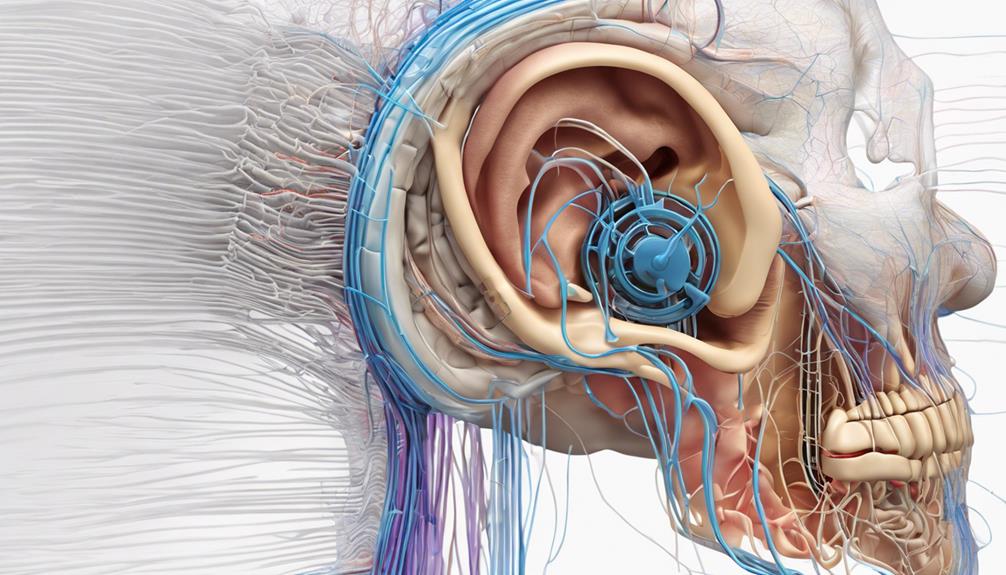
In the intricate network of the brain, the auditory cortex in the temporal lobe meticulously deciphers the intricate symphony of auditory stimuli received from the ears. Situated in the upper part of the temporal gyrus, this crucial region processes various aspects of sound, including pitch, location, and timing. Within the auditory cortex, different areas are specialized for distinct sound processing functions. Neurons in this region are tonotopically organized, meaning they respond to specific frequencies of sound, allowing for a detailed analysis of auditory input.
Damage to the auditory cortex can have significant consequences, impacting functions such as sound localization, speech perception, and overall auditory processing. This emphasizes the vital role this brain region plays in our ability to make sense of the sounds in our environment. Understanding the intricate workings of the auditory cortex provides insight into how our brains interpret and make sense of the auditory information we receive, highlighting the importance of this region in our daily lives.
Factors Affecting Signal Clarity

Factors influencing the clarity of received radio signals include the strength of the transmitter, distance from the source, interference from electronic devices or physical obstacles, receiver quality, atmospheric conditions, and antenna orientation.
Signal clarity can be affected by the strength of the radio transmitter and distance from the source.
Interference from other electronic devices or physical barriers like buildings can degrade signal quality.
The quality of the receiver and its ability to tune in to the specific frequency impact signal clarity.
Atmospheric conditions, such as thunderstorms or solar activity, can also influence the reception of radio signals.
Proper antenna orientation and positioning can significantly improve the clarity of received radio signals.
Ensuring optimal signal clarity involves considering these factors collectively. By addressing issues like interference, receiver quality, and antenna positioning, users can enhance their radio reception experience. Paying attention to these details can lead to clearer and more reliable communication through radio signals, ultimately improving the overall listening experience.
Frequently Asked Questions
Can Your Ears Pick up Radio Signals?
No, our ears can't pick up radio signals because they're designed to detect sound waves, not electromagnetic radiation like radio signals.
To convert radio signals into audible sound, specialized devices such as radios and antennas are required. Ears lack the capability to interpret the complex modulations and frequencies of radio waves, as they operate on different frequencies and wavelengths than the audible range detected by our ears.
How Are Radio Signals Picked Up?
We pick up radio signals similarly to how a net catches fish. Antennas intercept electromagnetic waves, converting them into electrical signals.
These signals are tuned by a receiver to a specific radio frequency. A detector demodulates the signal, extracting audio or data information.
Amplification boosts the demodulated signal to a level suitable for driving speakers or headphones. The process involves transforming electromagnetic waves into audible sound or usable data.
How Do You Detect Radio Signals?
We detect radio signals through the conversion of air pressure variations into electrical signals by our ears.
The process starts with the outer ear funneling sound waves into the ear canal, where they vibrate the eardrum. These vibrations are then amplified by the middle ear's three tiny bones before reaching the cochlea in the inner ear.
Inside the cochlea, hair cells transform the vibrations into electrical signals that travel to the brain for processing, enabling us to perceive and interpret the radio signals we pick up.
How Does a Radio Station Transmit a Radio Signal to Your Ear?
We receive radio signals thanks to a fascinating process. Radio stations send out electromagnetic waves from their antennas. These waves travel through the air and are captured by our radio receivers.
The receiver then changes them into sound waves, which reach our ears. Our ears convert these sound waves into electrical signals that our brains interpret as sound. This lets us hear the broadcasted content such as music or news.
Conclusion
In conclusion, understanding how our ears pick up radio signals is like unlocking the secrets of a hidden world within us.
The intricate mechanisms of mechanoreceptors, cochlea processing, and neural pathways work together seamlessly to bring us the gift of sound. It's truly a marvel of nature, allowing us to perceive the world around us in ways we never thought possible.
Keep exploring the wonders of radio signals and let your ears be your guide to a world of endless possibilities.

